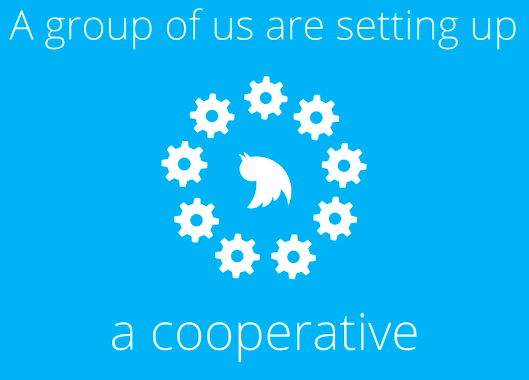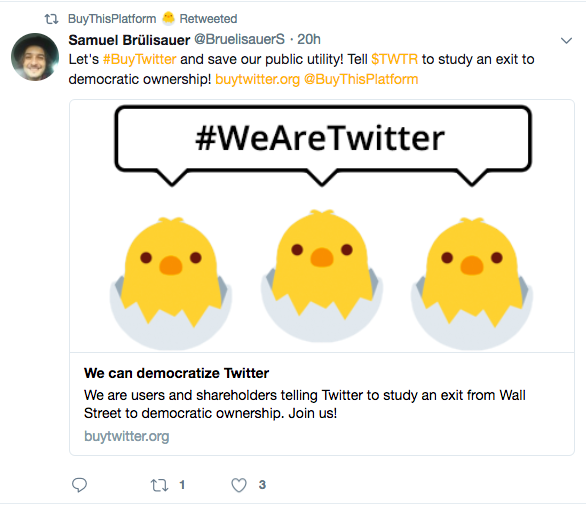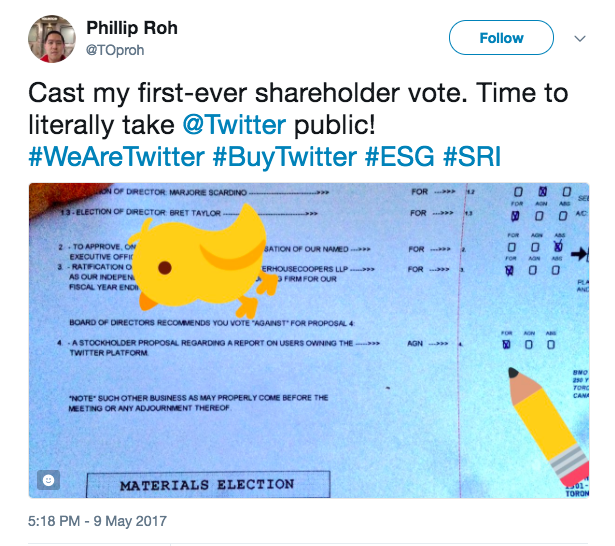#BuyTwitter and the Intersection of Civic Media and Platform Cooperativism
Wednesday, February 7, 2018
#BuyTwitter and the Intersection of Civic Media and Platform Cooperativism

By Gabriel Mugar, Danny Spitzberg , and Eric Gordon
There is a growing distrust in the ability of large institutions to represent a diversity of views and needs. Public processes face threats from lobbyists and private businesses that listen first (and only) to the interests of Wall Street. What will take to return a plurality of voices to important civic settings? We can see one promising path with #BuyTwitter, an attempt by activist shareholders to hold Twitter, Inc. accountable to its users and other stakeholders by making it a cooperatively owned business. This campaign reflects an intersection between civic media and platform cooperativism, two intellectual and activist movements concerned with holding space and building democratic power. In this post we consider what the #BuyTwitter campaign can offer to addressing the growing distrust in institutions that shape our society.
#BuyTwitter and Platform Cooperativism
Twitter is one of the handful of major platform for distributing and engaging with news content that shapes how we see the world. Similar to how major news outlets are viewed, there is growing doubt that Twitter can play a role as an unbiased news utility. This critique is pointed primarily at the company’s tolerance of harassment and bullying amongst users in the interest of supporting the bottom line of use, views, and ad revenues. In an increasingly hostile environment, Twitter users understand that they have no say in the company addressing these issues (although they will @ Jack Dorsey to no end). With a lack of response from management, it is clear that Twitter is failing to balance its profit generating interests with realizing its responsibility as an infrastructure for an informed and engaged public.
Recognizing Twitter’s value to the dissemination of news and social movements, and at a time when the company’s stock price fell to a worrying low, a group of activists and researchers decided to ask: How might we protect and strengthen the platform in ways a for-profit, publicly traded company can’t? What would it take for users to buy Twitter and form a cooperative? Could we create space for media and communications without being constrained by a need to maximize financial profit, but instead liberated to explore ways to maximize social gains?
These questions come out of the platform cooperativism movement, which seeks to bring greater responsibility and equity to digitally mediated businesses models. Rooted in the principles and models of cooperatives, the platform cooperativism movement**** seeks to reimagine the relationships that define modes of production in “platformized” business, where high profits rely on exploitative labor practices. In the setting of the #Buytwitter movement, one of the more prominent motivations is a need to redefine what governance looks like such that users have a greater say in ensuring the platform is a more inclusive and less hostile environment.

Platform Cooperativism and Civic Media
The tactical proposition to buy Twitter mirrors a growing conversation around civic media practice, an approach to media making born out the need to rebuild media infrastructure in the image of productive public engagement.
In the introduction to the edited collection *Civic Media: Technology, Design, Practice,* Gordon and Mihailidis define civic media as “any mediated practice that enables a community to imagine themselves as being connected, not through achieving, but through striving for common good” (2016: 2). Civic Media is therefore a description of media making rather than a genre of media. It is a process inspired by an ethic of care, where caring is a “species of activity that includes everything that we do to maintain, continue, and repair our ‘world’ so that we can live in it as well as possible” (Fisher and Tronto, 1990).
For example, this care ethic in the context of media making can be seen in the work of City Bureau, a newspaper in Chicago’s Southside that brings residents into the core of its operation by not only hosting its Public Newsroom to discuss with residents what issues need the most attention, but also actively trains and supports residents to be their own reporters. At its core, City Bureau’s practice is focused on how it listens to and supports its neighborhood so that issues affecting the community are represented and circulated for public conversation.
Like City Bureau, the #BuyTwitter activists seeks to redefine the relationship between an infrastructure of media distribution and production and its constituents. The shift in this relationship is one that would allow for the public to take greater care of an infrastructure that has value to democratic processes. Bringing people into the core of governing a media resource is where we see the goals and visions of platform cooperativism and civic media align. We also see a shared problem space, one that is concerned with scale.

Cooperatives and Civic Media at Scale
For a group like City Bureau, the scale of including and supporting a range of interest will always be bound by the geography of the neighborhood where they work. Similarly, while there are indeed exceptions, many cooperatives operate with a small member base. A space like Twitter however poses an interesting challenge for both civic media and platform cooperatives. Twitter does not have a unified audience or interest group. Users with competing political ideologies and world views are active on the platform and may have different views about the purpose of Twitter as a tool for communication. While the proposition to make Twitter a cooperative does not intend to favor any specific political position, it is likely to create well-defined boundaries around its purpose and function as a communication tool. In other words, as a response to an increasingly hostile and unproductive environment, the outcome of the the #BuyTwitter will likely lead to well defined approaches to governance and moderation and will remain content agnostic to the extent that content does not infringe on Twitter as a tool for a productive public sphere.
Scholars and practitioners of civic media and platform cooperativism are watching the #BuyTwitter campaign closely. As practitioners and scholars of civic media and platform cooperativism, we are particularly interested in understanding what a media practice rooted in an ethic of care look like at scale, and what the negotiation of shared interests will look like for a large scale media platforms like Twitter?
The #BuyTwitter campaign offers us a unique case study into what it would take to remake a giant media infrastructure in the image of values that align with interest of the many rather than a few, in the interests of social good rather than profit, and in the interest of robust and diverse and productive public sphere rather than a forum of divisiveness. Because of the overlaps around processes for negotiating shared interests, we encourage scholars and practitioners from the spaces of platform cooperativism and civic media to explore collaboration and knowledge sharing so as to not only benefit the #BuyTwitter movement, but other media based initiatives that seek to regain trust and cooperative governance strategies.
For further reading on #BuyTwitter, follow [@BuyThisPlatform](https://twitter.com/BuyThisPlatform)